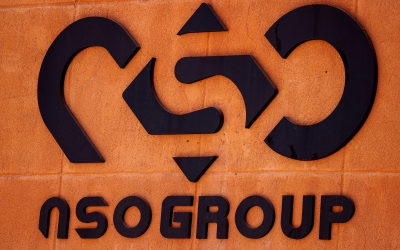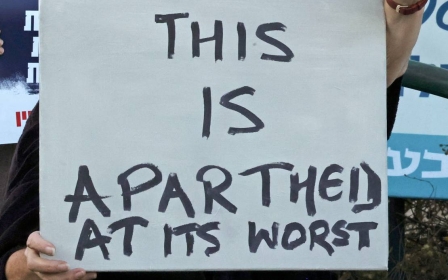Israeli press review: Tel Aviv and Bahrain sign security pact to tackle Iran in the Gulf

Israel-Bahrain's security pact
Israel's Minister of Defence, Benny Gantz, visited Bahrain on Thursday to sign a security cooperation deal with Manama and coordinate efforts against common foe Iran.
Israel and Bahrain had established diplomatic relationships following the US-sponsored normalisation deal in Washington in September 2020. They have since dispatched ambassadors as ties warm in various trade, tourism and security areas. Meanwhile, tensions in the Gulf have heightened between Iran and the Arab states, following Houthi drone attacks in Saudi Arabia and the United Arab Emirates.
The security deal was signed by Gantz and Bahrain's King Hamad bin Isa Al Khalifa at the royal palace.
The Israeli Ministry of Defence said in a statement that the memorandum of understanding "will support any future cooperation in the areas of intelligence, military to military, industrial collaboration and more".
The security pact is the first between Israel and a Gulf state, Ynet reported.
"Only one year following the signing of the Abraham Accords, we have achieved an important defence agreement which will contribute to the security of both countries and the stability of the region," Gantz said.
His visit came within a few days of a trip by Israel's President Isaac Herzog to the UAE, to participate in the Israeli national day event at Dubai Expo 2020. Gantz had also visited the US Navy Fifth Fleet's headquarters in Bahrain.
"Against a backdrop of increasing maritime and aerial threats, our ironclad cooperation is more important than ever," Gantz said on Twitter, after the naval base visit.
Bahrain also hosts some operations for the US Central Command (Centcom), a military umbrella that Israel joined last year. Israel is participating this week in a US-led naval exercise alongside 60 nations, including the UAE, Saudi Arabia and Oman.
On Wednesday, the US said that it would deploy a guided-missile destroyer and state-of-the-art fighter jets to help defend the UAE after a series of missile attacks by Yemen's Houthis.
The UAE has faced multiple attacks in recent weeks, the latest coming late on Wednesday, with the Emirates saying it had destroyed three drones with "hostile" intent.
Amendment to espionage law
The Israeli government is working on a law amendment that regulates the Shin Bet internal intelligence agency, which critics say would shield it from public scrutiny, newspaper Haaretz reported.
Shin Bet, or Shabak in Hebrew, stands for Israel Security Agency. Its operations and activities have been kept in the dark. Still, it has come under fire in the past two years, as Israeli citizens questioned its methods to track them for potentially breaking Covid-19 quarantine rules.
The new amendment to the Shin Bet law of 2002 would allow the agency to use state-of-the-art surveillance technology and spyware under a legal cloak, and tap into its rich database about Israeli citizens to carry out its operations.
According to Haaretz, Shin Bet law is mostly classified, and hence would not be subject to public debate or oversight. However, the law asks telecommunications firms operating in Israel to pass on information to the Shin Bet about messages and phone conversations.
In the past two decades, the Shin Bet has collected, stored and amassed data on a communications database. To use such data, Article 11 in the Shin Bet law states that the agency needs permits from Israel's prime minister and the attorney general, and the acknowledgment of the Knesset's subcommittee on the secret services.
However, Article 11 would go through an overhaul amendment "to adapt the article to the agency's current needs and to increase supervision and oversight of the agency's operations," Haaretz reported, without elaborating on the details.
The amendment would set a mechanism to prevent violations of human rights and privacy.
In June, the Association for Civil Rights in Israel (ACRI) protested against Shin Bet's use of phone tracking of Covid-19 patients and their contacts. ACRI said then that "the Shin Bet possesses an incomparably sensitive database on all Israeli citizens and residents and has advanced database-search capabilities that enable it, within hours, to ascertain every place a person has been, now and in the past, as well as his contacts with other people".
It added that the Shin Bet "maintains and searches this database without needing a search warrant from a judge or any outside party, and oversight of its use of the database is weak."
Female attorney general
Israel is appointing a new attorney general, following Avichai Mandelblit's retirement this week.
Gali Baharav-Miara will be Israel's first woman to occupy this position, endorsed by Prime Minister Naftali Bennett and Minister of Justice Gideon Sa'ar.
However, Baharav-Miara was criticised for lacking experience in criminal law, Haaretz reported, which deemed her unsuitable for the post.
Baharav-Miara, who is in private practice, had worked for 30 years in the civil department in Israel's state prosecutor's office, before leaving in 2016. Sa'ar said that "she's the best candidate, the most seasoned, the most appropriate, with the richest and most impressive professional and administrative background".
However, some Israeli critics noted Baharav-Miara's legacy as a public prosecutor in preventing Palestinians from filing cases against members of Israel's security forces. Baharav-Miara had pressed the courts to ask Palestinians - among them journalists, farmers, workers, or family members - to pay inflated fees if they wanted to pursue a legal case against Israeli military forces for attacking, shooting or abusing them. According to analyst Eitay Mack, Baharav-Miara's method in the court resembled legal practices in the apartheid regime of South Africa, Haaretz reported.
Amit Aisman is currently acting attorney general, after Mandelblit left on Tuesday. The Israeli cabinet is expected to approve Baharav-Miara's appointment next week.
Israeli press review is a digest of news reports not independently verified as accurate by Middle East Eye.
Middle East Eye propose une couverture et une analyse indépendantes et incomparables du Moyen-Orient, de l’Afrique du Nord et d’autres régions du monde. Pour en savoir plus sur la reprise de ce contenu et les frais qui s’appliquent, veuillez remplir ce formulaire [en anglais]. Pour en savoir plus sur MEE, cliquez ici [en anglais].






